Over at Gornahoor, I’ve made a rough translation of a short essay by Okawa Shumei, which you may find here: The Political Philosophy of Confucianism
Okawa never read René Guénon and had no connections to him, but as with my earlier Gornahoor posts, things will make a lot more sense if you have read Guénon.
Posted: February 28th, 2013 | Kokoro, Tradition
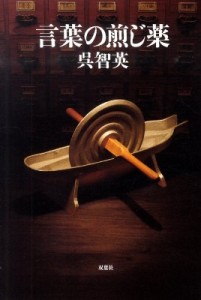
I thought I’d squeeze in another translation before work. This one’s by KURE Tomofusa, in his A Decoction of Language (言葉の煎じ薬, 2010). Kure needs no introduction.
In September 2006, the new Abe cabinet took office. Leftists and revolutionaries denounced him as a hawk and a nationalist, but how did he do really? Starting by confronting the issue of North Korean kidnappings of Japanese, he said things that naturally needed to be said all over Asia. He did, however, use an inordinate amount of loanwords in his inaugural speech; I didn’t think that very patriotic of him.
The one that made me uncomfortable above all was the phrase Country Identity [in English]. In the first place, it’s an oddly invented loan word, and furthermore isn’t the use of a loanword here an affront to Japan’s own “Country Identity”?
I had trouble getting used to the phrase “Country Identity” from the very beginning. It seems like he really just wanted to say “patriotism”, but that would invite a rain of punishment from the leftists and revolutionaries, so he used this ever-so-slightly different “Country Identity” instead.
There are three different words to refer to a country in English. The first is “country”, broadly 国. Its meaning is essentially derived from a place on the earth, and it also means the countryside, with some rural flavor.
The second is nation, which implies 国民, a conglomerate of people.
The third is state, the political 国家.
The Abe cabinet seemed to choose the term “Country” to demonstrate that they were not nationalists but wanted to emphasize Japan’s cultural and historical strong points. But using English to do that is an elementary contradiction.
“Identity“, on the other hand, seems like a more necessary borrowing here, because there is no appropriate translation for this word in native Japanese. The root word is form, idem, which in the original Latin meant “sameness”. When we translate its biological and chemical meanings, we have words like “confirmation” and “speciation”. “Identification” of a person or thing is translated into terms like “self-confirmation”, or “self-sameness”, or “self-verification”, or “independent being”, or even “individuality”. None of these words, though, are quite appropriate. Those all simply state that a thing is itself, but we are looking for a term that more approximates “Japanesey” (日本らしさ).
This loanword began being used in the 1980s. In English, of course, it’s been around a lot longer, but when I looked at English-Japanese dictionaries written before the 1980s, along with “the thing in itself”, I saw the term 正体,true form! It was so spot on the mark that I laughed.
The true form of the big Cyclops was a trickster raccoon.
If we translate this “true form” back into English, it would be “identity“!
The foreigner, whose true form could not be established, slipped through airport security.
Here, too, it wouldn’t be strange to use “identity” for true form正体.
It is quite meaningful that the usual Korean translation for “identity” is 正体性 (true-form-ness). I think this is a very powerful word.
You won’t find the term true form in Chinese dictionaries; it was invented in Japan. If you see any Koreans using it, I’m afraid that is a loanword from the colonial period.
But at the same time, I think this term reflects the “form vs. function” thought of the Shushi (Cheng-Zhu 朱子) school. The Shushi school was a branch of Confucianism that was exceedingly systematic and was exceedingly influential in China and Korea as well as Japan. In Korea it grew out of a political system and had an influence on customs and culture as well.
“Form vs. function” thought distinguishes the essence of something from the purposes it is put to. The modern Japanese grammatical terms for uninflected words [“essential words” 体言] and inflected words [“functional words” 用言] are derived from this way of thinking. When we append true 正 to form 体 like in the Korean “true-form-ness”, we get a translation for identity that, much more than “self-confirmation” or “self-samedness”, may be meaningfully applied to culture and history.
Posted: February 20th, 2013 | Kokoro
Shūmei Ōkawa is a Japanese religionist, Islam scholar, and class-A war criminal. On the first day of the Tokyo Trials, upon entering the courtroom he yelled nonsense in German, ran around the room, and whacked Prime Minister Tojo on the head, and was shortly found to be insane. While in the mental hospital, he made the first Japanese translation of the Qu’ran. Upon being released, he wrote a religiously oriented memoir, from which I translate two-thirds of this chapter.
Returning to the free spirit of the Japanese, I noted in the past that the word we use today to indicate the European words for “religion” (宗教) is merely a modern translation of that European concept. In the East, not only the Japanese, but also the Chinese and the Indians had no corresponding word for this concept. Religion is derived from the Latin religio, and there are several theories on the origin of religio, but I consider as with Cicero that it must have come from relegere, “to do a thing scrupulously”. As Cicero proceeds to say, “All matters concerning the gods are said to be practiced religiously,” and therefore, the Romans gave the term religio to those ceremonies honoring the gods. Furthermore, not only the Romans but other nations also thought that the existence of “religion” was derived from these ceremonies. In comparison, in the Chinese Book of History there are three words, 類[resemblance], 禋 [sacrifice], and 望 [hope] which refer to ceremonies for the gods, but there is no generalization for the three, and only in the Book of Rites to we start to see such general words 礼祠 [revere-enshrine] and 祭法[honor-law] which could correspond to religio. In Japanese, the terms matsurigoto [lit. “matters of state”] or kamiwaza [“matters of kami”] express the same idea. In India, the word Rita refers to the successful completion of a ceremony. So, there are words in the East which correspond to the Latin religio, but these are not terms which match the word religion used in the present day. Thus, when the Dutch came to our country as the first emissaries of Western civilization, at that time, the first translators invented new terms like 祭祀 [shrine-revere] or 宗祀 [sect-revere] to correspond to the European word religion.
Read the rest of this entry »
Posted: February 19th, 2013 | Kokoro
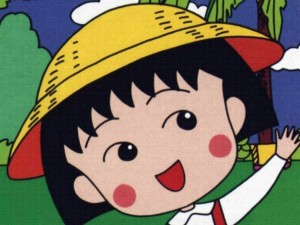
Chibi Maruko-chan is a Japanese children’s TV show full of pathos. For example, here’s the episode I’m watching now, starring Momoko Sakura (“Maruko”) and her best friend Tomo-chan:
Tomo-chan: (to herself) If Momoko becomes a movie star, she won’t be friends with me anymore!
Momoko: Tomo-chan, what’s wrong?
Tomo-chan: Oh, nothing! Good luck with your audition!
This show is targeted at 3 to 8 year olds.
Here are some Sayings of Maruko:
Maruko: “I always forget what I have to do for other people, but I never forget what other people have to do for me.”
Hiroshi: “To live is to forget. If we humans remembered everything, we’d be so sad that we couldn’t go on living. That’s why God lets us forget.”
Noguchi-san: “Heh heh heh. People who laugh quietly to themselves are so much deeper than cheerful people, cause we don’t let our feelings out. Even if you think it’s a defect of mine, it’s really my strong point… heh heh heh…”
Maruko: “If only we had a Cold Bank. On days when you don’t want to catch cold, put it in the bank, and take it out when you really need it.”
Maruko: “Who needs Christmas cards? People who would get angry if you don’t send them cards aren’t good friends anyway.”
Fujiki: “I may be a coward, but I never lie to myself!”
Posted: February 3rd, 2013 | Japan
Here is a little tour of my trip to Yakushima and my recommendations for people traveling there.
This is Sakurajima, not Yakushima, but it’s a cool picture:
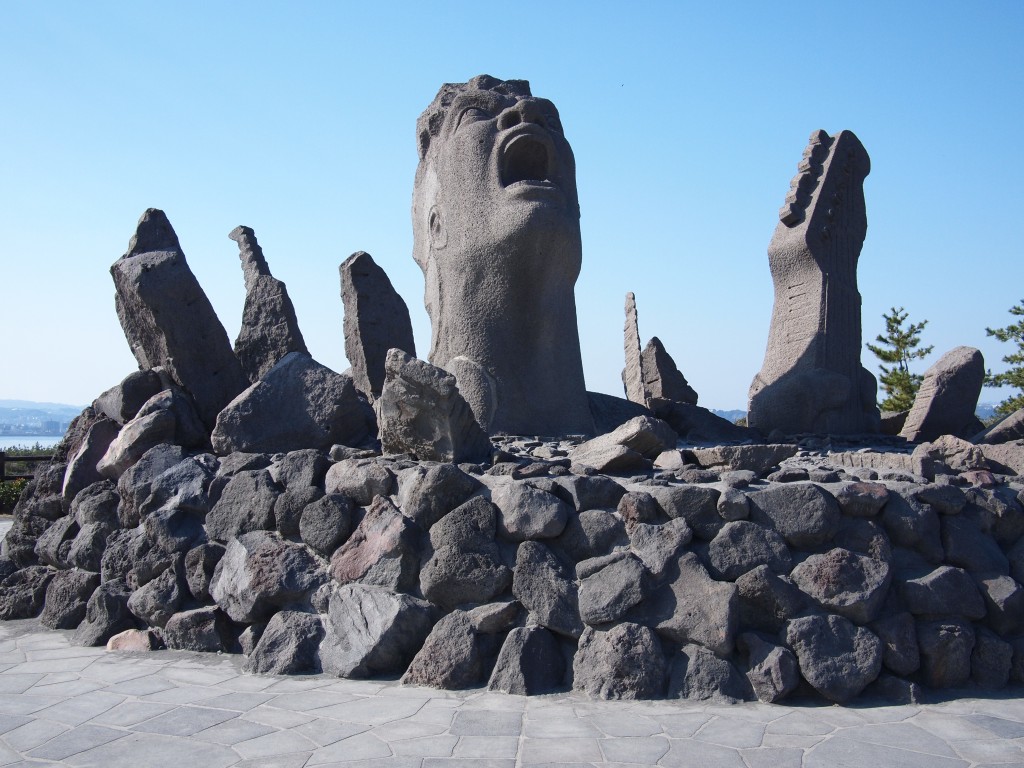
Read the rest of this entry »
Posted: January 15th, 2013 | Travel
Ichigen koji (一言居士): A person who has something to say about everything.
When equality advocates proclaim equality, they are like the invading nation who, having exterminated a local population, proclaims, “there is no ethnic discrimination in this country!”
— Tomofusa Kure, Kyoto University manga critic and self-proclaimed feudalist
(source)
Posted: January 9th, 2013 | Overheard
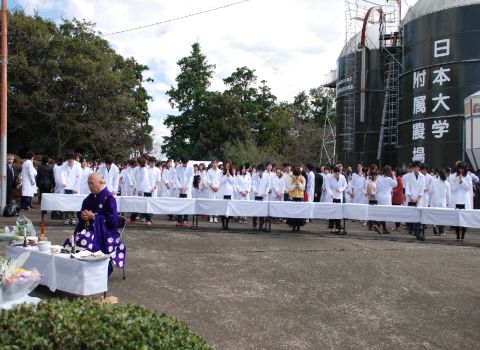
A memorial service for laboratory animals that died in medical experiments, held on November 2, 2012 by the faculty and staff of the College of Bioresource Sciences at Nihon University.
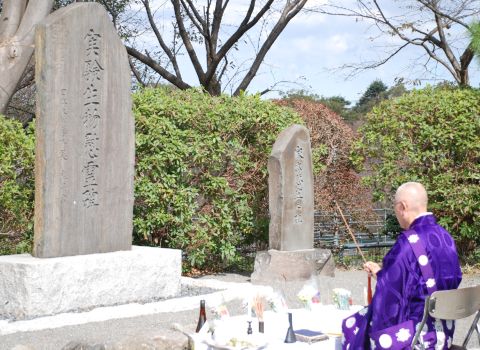
At left, the memorial marker for the animals. A Buddhist priest prays for the repose of the animals’ souls. Such ceremonies are held annually at most Japanese universities.
Posted: January 6th, 2013 | Japan, Photography
On Japan’s 1000 yen bill is a picture of someone named Hideyo Noguchi. He is remembered in Japan for overcoming a humiliating deformity and discovering the bacterial agent of syphilis. He worked for many years in America, often doing his research alone and avoiding confrontation by his peers. His methodology was flawed and most of his other work has been proven faulty or useless. This seems like important but not exactly the work of a national treasure along the lines of Jefferson and Lincoln, until you learn that he was a guy who loved getting awards, and went all over the world receiving awards from presidents, kings, and queens.
The Japanese who Europeans and Americans want to see is the sniveling mandarin, constantly retreating and apologizing, grateful and overwhelmed by treats and prizes from his white masters. This is a Japan that buys its way into a space on the international stage, through paying for 20% of the upkeep of the United Nations and other expensive tickets, and receives no authority in return, so that its interests can constantly be ignored in the Security Council. It is a Japan that can deserve our pity, as it did in the 2011 tsunami, but never our respect, and like the constantly rotating prime ministers it is easily forgotten; the servant of the day.
The Japanese who Europeans and Americans do not want to see is Yukio Mishima, a man who articulated and understood his own principle, and then transcended it; the kamikaze fighters, who, without ever hearing the words mors triumphalis, realized the heroic principle of the Roman warrior in the 20th century. The prospect of a foreigner who embodies fear and respect made “world opinion” very uncomfortable, and this type has been almost totally weeded out at present.
Noguchi, who was always respected, has become a 21st century hero and children are expected to imitate his dogged pursuit of “world opinion”. But when the Pax Americana ends, it will become suicidal to bow before “world opinion”, and in the East Asian territorial disputes we are seeing very early stages of preparation for that time. So, let the overseas newspapers clamor and cry. The future needs warriors, not mandarins.
I doubt many people in America know who Noguchi is or can tell you the names of recent prime ministers. A much larger group of people know who Mishima is, and everyone knows the meaning of “kamikaze”.
Posted: January 6th, 2013 | Japan
Japan last reformed its lunisolar calendar in 1844, before adopting the Gregorian calendar in 1873, complete with an educational program and explanatory material, as documented by Matt and by Stefan Tanaka. However, the old calendar is still used for a number of things, like astrological calculations, old festivals, and determining the Earth Cycle Days of the Ox. Alas, all this will go awry in the year 2033, when the calendar will be unsure what month it is for a lengthy period of time.
In the 1844 reform, the month with a winter solstice in it is always called November, the vernal (spring) equinox’s month is called February, the summer solstice’s month is called May, and the autumn equinox’s month is called August. Furthermore, these four days are part of a full set of twelve chuuki, making up half of a solar term. When a chuuki falls during a month, it is assigned a name based on the solar term. If there is no chuuki during a month, it is declared an intercalary month.
Most years, there are only two months between August and November. (But don’t take my word for it–check it yourself!) With intercalary months there are at most three. But this calendar does not allow for there being only one month between August and November, or for two chuuki over a single 30 days. In 2033, as Wikipedia helpfully tells us, the following series arises:
- Month A: normal July chuuki, clearly July.
- Month B: no chuuki.
- Month C: autumn equinox (August?)
- Month D: one chuuki.
- Month E: winter solstice and another chuuki together (November?!)
- Month F: no chuuki.
- Month G: two chuuki together.
- Month H: no chuuki.
- Month I: vernal equinox, marking February.
Therefore, from August 2033 to February 2034, we will not be sure what month it is. If we live our lives by the old calendar, that is.
A very simple adjustment to the calculation of chuuki could be made so that 2033 proceeds without trouble. Also, a rule needs to be set up, like in the Chinese lunisolar calendar, to cover this kind of exception. But both those changes would require an official, legal adjustment to this obsolete calendar.
Posted: December 10th, 2012 | Japan
“Mr. Morrow,” said an English teacher. “Did you hit a student with your bike this morning?”
I understood what he was talking about but not why. Yes, that morning at 8:20, I had rounded a corner and was surprised to see another bike, its driver wearing a high school uniform and a scarf around his face, coming directly towards me. We brushed each other, I turned around and asked “are you okay?” only to see him disappear around the corner. I silently cursed the rudeness of high school kids, and pedaled on. That was several hours ago.
“That student went to the hospital,” the teacher continued. “He had a bruise, and his pocket was torn.” He gave me a piece of paper. “Would you be willing to write a statement explaining what happened?”
The last time I had been made to write a statement explaining my actions was in elementary school, when I was caught using spell check on a spelling test. I knew Japan did not assign fault for accidents, but I felt like socially, I had just been accused of something outrageous–like I had knocked the kid off his bike and then ran away. But that’s not what I did.
Or was it? Had I really seen that student go on to school as if nothing had happened? If I hadn’t, I would have stopped my bike. Right?
The only reason the high school had identified me is because I’m the only foreigner in town. If I had been anyone else, I thought self-righteously, that kid wouldn’t have known what hit him, and that would teach him to flee from the scene of an accident. My memory was uncertain, but I still felt wrongfully accused by the whole process. I was made to take a photocopy of the statement down to the board of education, where one of my coworkers, Okita-san, translated it into Japanese. I expressed my disbelief to her.
“I don’t think you’ll have to pay for the torn pocket,” she reassured me. “Insurance will cover it.” Read the rest of this entry »
Posted: November 9th, 2012 | JET





